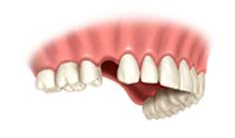 SINGLE TOOTH MISSING
SINGLE TOOTH MISSING
Benefits of an all-ceramic crown on implant:
When both the tooth and root are damaged, the best permanent replacement is a dental implant in conjunction with a ceramic crown. This solution both looks and functions just like a natural tooth.
In this case, a so-called one-piece implant is used. This means that all components are installed as a single unit, resulting in immediately full functioning teeth, shorter treatment time and minimized pain.
- Immediately functioning teeth
- Excellent esthetic result
- Life long, stable solution
Treatment:
This procedure normally includes four visits to the dentist. You should expect to be able to work the day after having the implant installed.
>> View Treatment Procedure
COURSE OF TREATMENT
INSTALLING THE NEW TOOTH – STEP-BY-STEP
The course of treatment described here is one of several options available. Consult your dentist to find out what the best solution is for you, given your specific condition.
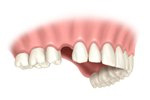 |
|
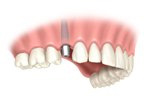 |
1: Before the procedure
The dentist makes a first examination and takes one or more x-rays of the area to prepare for the procedure. |
|
2: Installing the implant
The implant is installed. At this time, a temporary tooth is provided that allows you eat and function like normal almost immediately. The implant will need a few months to integrate with the jawbone before the next step is taken. |
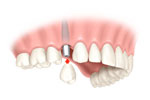 |
|
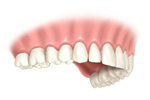 |
3: Attaching the new crown
The final step is the placement of the permanent ceramic tooth. The new tooth is installed for life. No additional treatment is needed. |
|
4: End result
You should expect the new tooth to fit and function just like a natural tooth. Do your usual dental hygiene to keep the tooth and gum around it clean and healthy. |
ALTERNATIVES TO AN ALL-CERAMIC CROWN ON IMPLANT
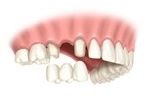 |
Tooth-supported fixed bridge
A traditional bridge involves grinding down adjacent teeth to support the bridge. It is a stable solution with good esthetics and function that is fairly easy to install. However, this alternative has two main disadvantages: continuous bone resorbtion in the edentulous area, and sacrificing healthy teeth on behalf of the bridge. |
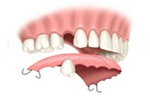 |
Removable partial denture
This is not a permanent alternative to a lost tooth. It is unstable and loosely attached, which affects both function and comfort. A removable partial denture is made of plastic – a material that can't create the same esthetic result as a ceramic crown. The benefits are few but do exist: adjacent teeth aren't affected. It is easily and quickly installed and relatively inexpensive. |
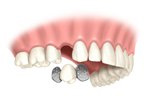 |
Resin-bonded bridge
This alternative has some clear advantages: it is quickly installed, functions well and, since it is made of ceramic, it gives a high esthetic result. Moreover, natural healthy teeth aren't affected. But it is not very permanent. The resin-bonded bridge will eventually come off – probably after just a couple of years – and will then have to be reinstalled. |